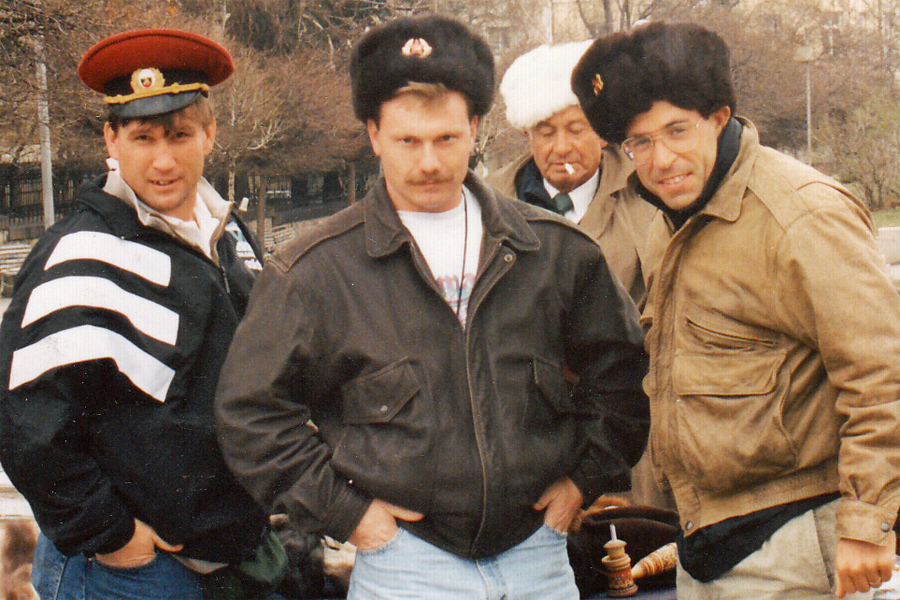March
18-19, 1995. First Annual Sofia Sevens: Atlantis
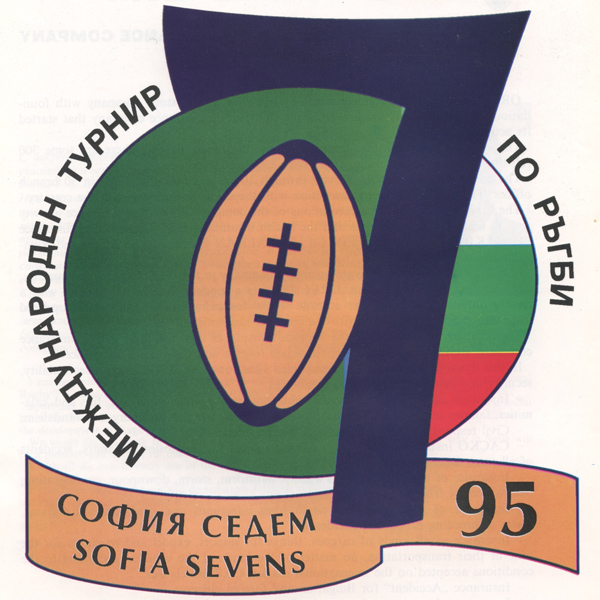
Logo for 1995 Sofia Sevens
As the only western team in a tournament whose
other participants were from Bulgaria, Yugoslavia (which we call
Serbia), Ukraine and Romania, Atlantis put on a sevens clinic
and handily won the championship with a 26-7 victory over
Ukraine II in the final. Although there were a few
glitches in the tournament, the fact that it took place at all
hopefully augurs well for the future of sevens in Eastern
Europe. Atlantis were certainly glad that we participated:
we enjoyed playing well, we enjoyed winning, and we enjoyed the
off-the-field aspect of our visit every bit as much as the
rugby.
Bulgaria?
There are two types of reaction to the opportunity
to play sevens in Bulgaria:
Bulgaria? Who the hell would want to go there?
and
Bulgaria? What a great opportunity!
I belong to the latter group, and when the announcement of the
tournament came my way, I immediately decided that Atlantis would
enter. Fortunately, I was able to find nine players that felt the
same way, and from the beginning there was a good feeling among us
that this trip would be a) a revelation, and b) fun. We were
correct on both counts.
Bulgaria
"Although we are in Europe," several people told me, "in many ways
we are more Asian." Indeed, Bulgaria lies just a stone's
throw from Asia in southeastern Europe, surrounded by Turkey,
Greece, the former Yugoslavia, and Romania. Overrun
frequently throughout history, Bulgaria was ruled by the Turks for
more than 500 years, and the mistrust between the two peoples is
still evident. A former Warsaw pact nation, Bulgaria has
been undergoing both the joys and difficulties of democracy during
the last five years.
Bulgaria is unique in many ways: one of the most difficult for us
to cope with was the fact that Bulgarians nod their head to mean
"no," and shake it from side to side for "yes." . . . Think
about it . . .
Rugby in Bulgaria goes back only to the 1960s and remains a very
minor sport. As in the US, however, the people that do play
rugby are particularly dedicated to the game.
Atlantis
The team for Atlantis' 20th
tournament abroad consisted of
Name
|
Club
|
Position(s)
|
Bill Russell
|
Old Blue
|
SH & Captain
|
Keith McLean
|
Phila/Whitemarsh
|
Prop
|
George Miller
|
Charlotte
|
Hooker
|
Jason Fox
|
Cleveland Rovers
|
Prop/Hooker/SH
|
Chris Carney
|
Montauk, OMEX
|
Prop
|
Brian Collins
|
Washington Irish
|
FH
|
John McCluskey
|
Manhattan, OMEX
|
FH, Center
|
John "Spike" Walsh
|
Portland / OMEX
|
Center, Wing
|
Kevin Gallant
|
Daytona
|
Wing
|
All nine players have sevens pedigrees: Chris Carney represented
the US at the Punta del Este Sevens this year; Jason Fox was the
Midwest captain at last year's ITTs, and Brian Collins the East II
captain. Russell, McLean and Gallant have all represented
the East, and Walsh and McCluskey are Atlantis veterans.
Team guest and cameraman was my son Rik, happy to miss a week of
his junior year in high school.
All the tour members were looking forward not only to playing for
Atlantis but to the experience of visiting Bulgaria.
Costs
Transportation, room and food in Bulgaria was
covered. Although we had to pay our own airfares, the
tournament arranged with Bulgaria's national carrier, Balkan
Airlines, to give us a round-trip fare of $450 from New York, well
within everyone's budget.
Keith McLean got about half the kit cost sponsored, and every one
got some neat kit at bargain prices.
What I couldn't do, however, was negotiate us an exemption from
the $250 entry fee; normally when we travel this far, we are
relieved of that cost. After seeing the internal bickering
that goes on among the Eastern European countries, however, I
could understand the organizers' reluctance to relieve the "rich
Americans" from that fee.
At any rate, except for the cost to get to New York and
discretionary expenses (meals out, beers, casino losses,
etc.), the total cost was less than $700 per person.
Weather and Women
When I asked the tournament director, Nikolai Kolev,
what the weather would be like, he answered simply "The weather in
March is as changeable as a woman's behavior." I wasn't sure
exactly what that meant, but it sounded like something to worry
about.
After leaving a pleasant 60 degree day in New York, we stepped off
the plane in Sofia to a biting, windy, 25º F day. It turned out to be the
coldest March 14 in 60 years, but that knowledge didn't help the
players' hands during outdoor practice, and the 2 inches of snow
that greeted us the next morning left some of the players
wondering where I'd taken them.
By Saturday and Sunday, however, the guys were lying shirtless on
the hillside surrounding the field, snow-capped mountains in the
background, watching the games in still, sunny, 70-ish
temperatures.
Are women really like that?
Nikolai and Vesso
The inspiration for the Sofia Sevens, and our main
contact, was Nikolai Kolev, the President of the National Sports
Academy Rugby Club, part of the Department of "Football and
Tennis" at the Academy. He constantly attended to my faxed
questions, was at the airport to greet us, and available for help
and comradeship at all times.
He also arranged for a scrimmage with the National Students team,
based at the National Sports Academy, and brought me in to give a
talk on the principles of sevens to the NSA team.
Vesselin Stoyanov (Vesso) was to be our liaison and constant
companion during our time in Sofia. Vesso, a professional
tour guide who speaks a seemingly infinite number of languages is
a true rugby person -- player / coach / referee / aficionado,
dedicated and perhaps even addicted to the game -- the kind of
person every rugby-poor nation -- like Bulgaria and the USA --
needs if it is to survive.
He spent almost every waking moment between Tuesday and Sunday
with us and became not only our tour guide and interpreter, but
also our friend.
National Sports Academy
The National Sports Academy is a college that serves to develop
many of Bulgaria's top athletes (candidates must pass a physical
exam in their sport to be admitted). As the training
ground for many of Bulgaria's top athletes, it has regularly
produced world-class athletes, with wrestlers and weightlifters
among the most successful. Rugby's home, the Department of
Football and Tennis, has a lot to be proud of: Bulgaria currently
has both a Soccer World Cup semifinalist and three world top 20
tennis players (the Maleeva sisters) to its credit.
Facilities are excellent, and we were able to train not only on
the NSA rugby pitch, but also on a full synthetic turf pitch
completely marked for rugby as well as indoors on a team handball
court.
We also stayed at the NSA dorms, which featured -- well, let's
just say less than luxurious college type rooms and
food. But we survived, and it wasn't like we were
missing all the comforts of home: the basement had a cafe with a
pool table where you could get refreshments, including beer and
wine.
Week's Agenda
Follow the yellow brick road. We arrived on Tuesday
in time for lunch, after which we made a quick walking tour of
parts of Sofia, including the beautiful Alexander Nevsky Memorial
Cathedral, in the neo-Byzantine style, changed money, and
discovered that we were in -- OZ! Yes, downtown Sofia is
covered with a yellow brick road!
Jason Fox,
George Miller and Kevin Gallant shopping for "expired" USSR
souvenirs on our city walk
Practices. Tuesday afternoon, after a bitterly cold
hour of practice outdoors, we added nearly another hour
indoors. Most of us went to sleep at an early hour, but some
of the boys went for a stroll through the local student area,
stopping in at one bar where Spike bought all 33 patrons a shot of
vodka. American diplomacy had begun!
Wednesday morning we practiced in the snow, and later in the day
played four periods of sevens against the National Students.
Although we beat them, it wasn't easy: they were hard and
difficult to tackle, they seemed fitter than we, and we hadn't got
our depth or our support play right.
Wednesday evening the boys went out on the town, and, among other
things, the distribution of wealth among the players changed after
a visit to the casino. I spent a pleasant evening at the
home of Nikolai and his wife Tanya engaged in an "In vino veritas"
discussion of the ways of life in Bulgaria, the US, and other
profound topics.
Dancing on fire. Thursday was sleep-in day, but
Thursday afternoon we practiced again, this time in the mud, after
which I gave a presentation on sevens to the NSA team. That
evening Vesso, Nikolai and Tanya accompanied us to a first-class
Sofia restaurant where we were treated to traditional Bulgarian
music and dance, including a fire dance over a bed of embers, a
ritual celebrating the end of the harvest, that goes back as far
as pre-Christian days.
We also got the rookies on the dance floor to perform the chicken
dance for the amusement of their teammates and the rest of the
guests.
Macedonian Monks. On Friday we took a two-hour bus
ride to the Rila Monastery, perhaps the most famous attraction in
the country. Located in the Macedonian section of Bulgaria,
nestled between towering mountains, the monastery remained a
stronghold of Bulgarian art and learning during the five centuries
of Ottoman rule.
A most rare request. I have no illusions that players
agree with the length or frequency of my practices; they all think
they're too frequent and too long. So it was that I was
astonished that the team asked for a practice upon returning from
the Rila monastery late Friday afternoon.
We went to the synthetic turf field, and rushed to get a 45-minute
practice in before dark. When the lights unexpectedly went
on, the players were pleased: we could stay longer to refine our
game more!
Actually, it was at that practice session that we first really
"clicked," and I think we were all glad it took place.
St. Patrick's Day and Italian food. With more
than half the team of Irish extraction, it was no surprise that we
managed to find a St. Patrick's day party at the Hotel
Sofia. Following a brief stay, combined with a great desire
to get off our meat and potatoes diet of the previous days, we
found a great Italian restaurant, Borsalino's, in the middle of
town. After a fantastic pre-tournament pasta dinner, we
went, en-masse, back to the kitchen to thank Piero, the Italian
chef.
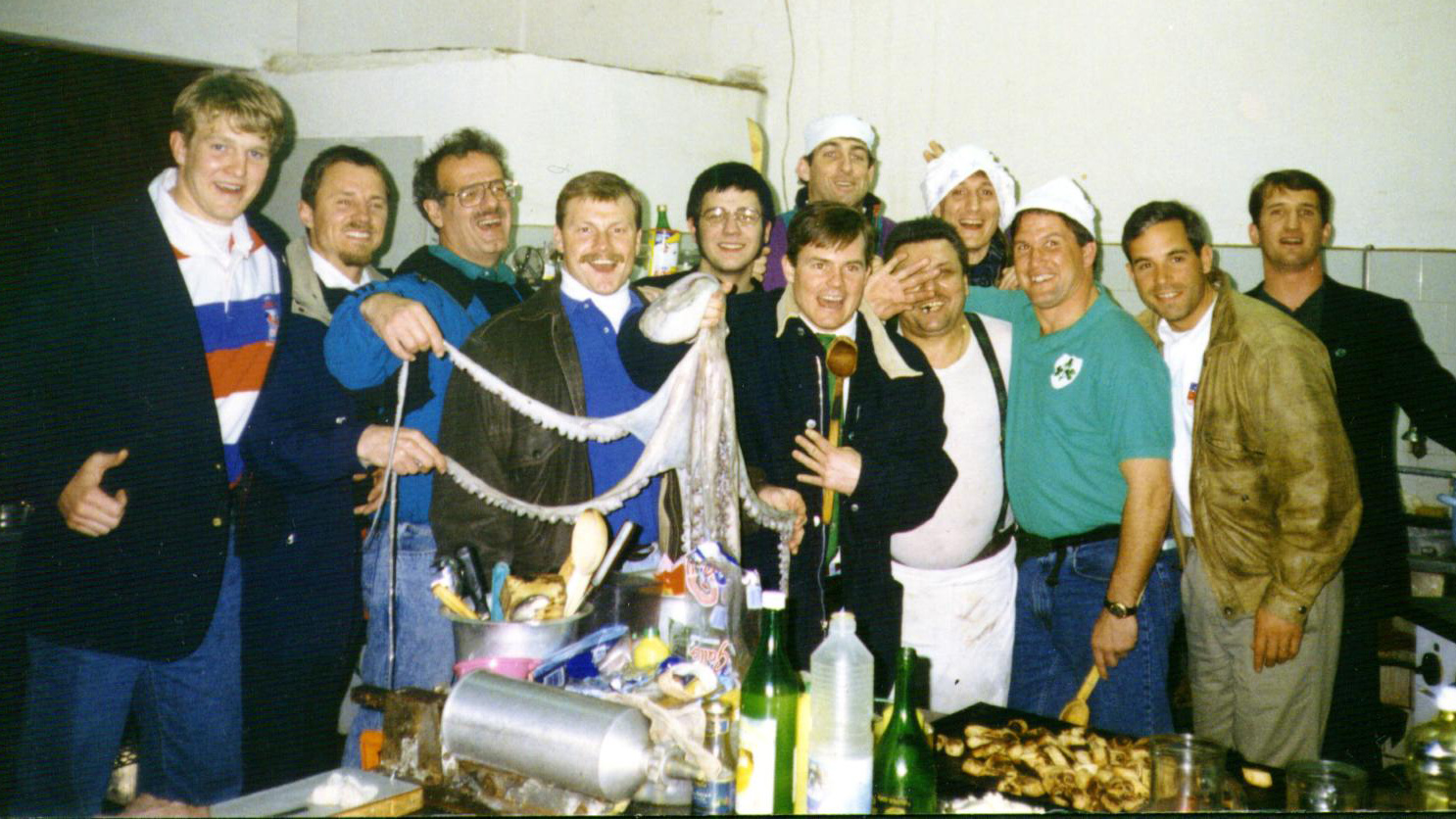
Atlantis with Chef Piero (and squid) in Borsalino's
kitchen
In back: Keith McLean and Bill Russell
In front: Chris Carney, Brian Collins, Emil Signes,
George Miller, Rik Signes, John Walsh, Piero, Jason Fox, Kevin
Gallant, John McCluskey
The
First Annual Sofia Sevens: the Competition
Round Robin
Reminiscent of a scene with which many American
tournament organizers are familiar, the expected field of 16
narrowed to 12 on the last day: although physically present in
Bulgaria, Georgia refused to play because of their upcoming 15s
match with the Bulgarians, and the Moldovan, Latvian and
Lithuanian representatives simply didn't appear.
The tournament was reorganized to 12 teams, and run in a
mini-Hong-Kong format: 4 brackets of three with the winners
advancing to the Cup, the second place teams to the Plate, and the
third place teams to the Bowl.
Atlantis was bracketed with Kredo 63, a Ukrainian team from
Odessa, and Partizan of Belgrade, Yugoslavia's top team. The
other two favorites, Ukraine and Yugoslavia, headed brackets B and
C, and the Bulgarian National Students headed bracket D.
Saturday: Atlantis 35 Kredo-63 3. Atlantis
started out very slowly and nervously, but eventually got two
first half tries. After stretching the defense to one side
of the field, the ball came back quickly to John Walsh for one of
many classic sevens tries. The second try, scored by Jason
Fox, came off a pressure "red" defense, as did the first try of
the second half, scored by Keith McLean.
Atlantis' fourth try came from cleanly won lineout ball: a John
McCluskey loop of Walsh put Kevin Gallant clear for a 50 meter
try. The final score came after a kick ahead and a couple of
football passes, and was scored by John McCluskey.
Atlantis 28 Partizan 0. Despite the score, Partizan
gave Atlantis much tougher opposition. In the first half
Atlantis' only score came after Brian Collins burst through a tiny
gap following a quick throw in near Atlantis' own line. He
burst 70 meters before being caught by the speedy Partizan wing,
and then executed a beautiful switch with George Miller for the
score.
The second half opened with a won kick off quickly spun out to
Kevin Gallant who simply outraced the opposition.
The Partizans then created an overlap and what looked like a long
break was broken up when Jason Fox, playing the 2 on 1 perfectly,
picked off the pass and scored himself. Jason then finished
the scoring on the ensuing kickoff when he received the ball from
Keith McLean, dummied to Bill Russell and went the 60 meters on
his own.
Bill Russell converted all nine tries on the first day.
Other brackets. Ukraine I easily won Pool B, but
Yugoslavia was upset 7-5 by Ukraine II in their Pool. The
Bulgarians won their bracket and the semifinal brackets were set.
Saturday afternoon: a search for Sky! Saturday's play
ended before 3 o'clock which gave us nearly two hours to find the
England-Scotland game on Sky TV. Given the fact that our
captain was a Scotsman, this search took us throughout Sofia where
we learned that while satellites were common and Eurosport
ubiquitous, Sky was elusive. For a while we got a cafe to
let us listen to it on BBC's World Service, but after his
customers complained, we got the boot. I'm not sure it was
worth all that effort to watch twelve kicks but no bodies cross
the goal.
Yugoslavia or Serbia? We visited Borsalino's once
more, this time accompanied by Sasha Leskovar, a member of the
Yugoslav national team who knew Atlantis from last year's Benidorm
Sevens. We had long discussions about the problems in his
country but got no closer to solving them than anyone else
has. The people that live in the part of the world we call
Serbia and Montenegro call their country Yugoslavia. As that
was also the term the tournament used, I have accepted that
nomenclature for this piece.
When I asked Nikolai whether there were any teams from parts of
the former Yugoslavia other than Serbia invited, he said that he
had been afraid, for the obvious reasons, to invite them, although
he heard that there probably would have been no problems. Just as
in basketball, the national rugby team from the former Yugoslavia
would have contained significant numbers of Croatians and Bosnians
as well as Serbs. What a piece of work is man . . .
Eastern European Tension. One thing I learned perhaps
more by observation than conversation was the tension that exists
among the Eastern European countries. To give just one
example, there was an ugly incident in which a Yugoslav player
spit on a Ukrainian referee at the end of a game in which his team
had lost to a Bulgarian team on the final play. At a
manager's meeting to discuss the sanctions (the player was barred
for the remainder of the tournament and will be reported to FIRA),
you could sense and hear the anger -- seemingly along national
lines -- about the process by which the Committee had reached its
decision. If we think we have problems among our
territories, we'd better think again, and be thankful. . . .
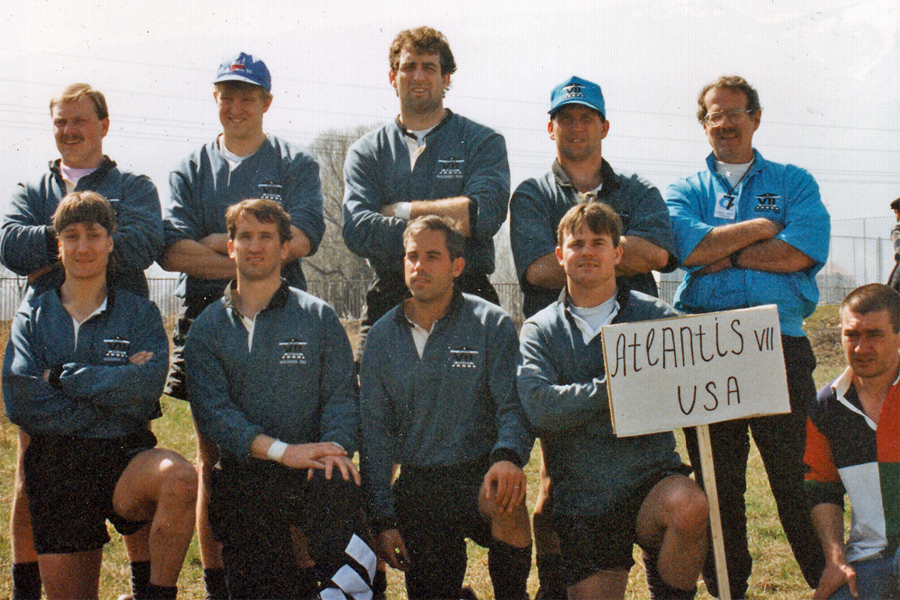
Atlantis VII at the tourney; Vesso joined us
The sign was
drawn by a local; creative mixture of upper and lower case
Top, L to R: George Miller, Chrisi Carney, Keith McLean,
Emil Signes
Bottom, L to R: Bill Russell, John McCluskey, Kevin
Gallant, John Walsh, Vesso Stoyanov
Finals Day
Sunday: Semifinals. Atlantis 14
Ukraine I 5. Atlantis took on its toughest
opponent, Ukraine I, in the semifinals. On paper, this was
to be a rematch of the Benidorm semifinals last year, won by
Ukraine 28-7, but in actual fact, this Ukrainian team was not as
strong as their 1994 team.
Following a series of Jason Fox incursions into the well-organized
Ukrainian defense, he finally committed two defenders and quick
ball spun out to Kevin Gallant got him into the clear for a
70-meter try on the last play of the first half.
The second half began with a kickoff won by Keith McLean that was
quickly moved to the backs. George Miller looped Spike Walsh
and again, Kevin Gallant put in a long run to score.
Ukraine scored shortly thereafter when an incorrectly called "red"
defense put a player into the clear, but good chasing by George
Miller kept the scorer from centering and the missed conversion
gave Atlantis breathing room. The final score remained 14-5.
Chris Carney. Chris Carney, one of the top young
sevens players in the US, arrived at JFK ill and never fully
recovered. He was ill all Friday night and didn't play on
Saturday. He began the semi-final game, but realizing early
that he wasn't 100%, took himself out after three minutes in an
act of uncommon unselfishness.
Championship Finals. Atlantis 26 Ukraine II 7.
Atlantis lineup:
1 McLean
2 Miller
3 Fox
4 Russell
5 Collins
6 Walsh
7 Gallant
The second Ukrainian team advanced to the finals after a tight
10-7 victory over the Bulgarians.
True to their pattern, Atlantis didn't score until the seventh
minute of this game, when the OMEX shield play produced a try:
Miller to Russell to Fox. Russell converted from the left
corner.
Fox also scored the second try, his fifth of the tournament, after
a long series of passes in the open field plus movement off the
ball eventually created space.
With a 14-0 half time lead, Atlantis pulled away in the second
half when Gallant scored from a counter-attack after an
ill-advised Ukrainian kick. From the next kickoff, the ball
got pushed across behind the 22 when Brian Collins took it forward
into a gap, committed two players and fed Spike Walsh on a
burst. Spike finished the 70-meter try, and nicknamed
himself "Bookends," for having scored the first and last Atlantis
try.
With 3 minutes to go, Ukraine scored from a quick penalty play to
close out the scoring at 26-7.
Other finals. Triumph, a junior side from Romania,
won the Bowl, and Yugoslavia easily won the Plate.
Comments on play. Although not necessarily more
athletic than several of the teams in the competition, Atlantis
was not only the oldest, but the most experienced in sevens
techniques. We "played the pattern" -- maintaining, with
hard work and discipline, support in depth and width, and executed
a defensive scheme that alternated between 6 + a sweeper
(depending on the formation, either the wing or fly half swept)
and seven across with end players as "half sweepers" (usually wing
and scrum half or hooker).
Our style of play was a revelation to several of the teams in the
tournament, and we were all asked frequently about strategy in
several areas of the game (which of course made all of us feel
good). If our visit to Sofia produced some missionary work for
sevens in Eastern Europe, then, certainly from my perspective, our
tour was a success.
The press certainly gave a religious twist to our performance; the
sports section of Monday's paper compared Atlantis'
exhibition of sevens style to Christ's revelations to his apostles
at the Last Supper. This was probably a "good thing"; but if
some guy were to have kissed any of us on the cheek during the
next few days, there might have been cause for alarm.
Atlantis Scoring Summary:
Name
|
Tries
|
Conv
|
Points
|
Russell
|
0
|
14
|
28
|
Fox
|
5
|
0
|
25
|
Gallant
|
5
|
0
|
25
|
Walsh
|
2
|
0
|
10
|
McCluskey
|
1
|
0
|
5
|
McLean
|
1
|
0
|
5
|
Miller
|
1
|
0
|
5
|
Total
|
15
|
14
|
103
|
Opponents
|
2
|
1+PK
|
15
|
MVP: any? There was no official tournament MVP, but had
there been he would likely have been from our team, and at the
banquet, people lost no time in telling me who their favorite
American player was. The president of the NSA was so
impressed with Kevin Gallant's fitness and speed that he had me
bring him to the head table and presented him with a bottle of
grappa.
For the power fans, Keith McLean's awesome display of dominance at
the kickoff plus a devastating tackle that put a Ukrainian player
out in the final, gave him the nod. Those that like
point guards quietly setting people up and occasionally popping in
three pointers, noted that captain Billy Russell's leadership and
pinpoint kicking (kickoffs and conversions) made him the
tournament's most valuable player.
The "fat man makes good" crowd noted that Jason Fox's all-around
play -- ball-winning, defense, try-scoring, made him "the
man." I personally felt we were too team-oriented to have an
MVP. (But pressed for a name, I think I'd have to go
with Foxie.)
The Banquet: the same
everywhere!
The banquet was a wonderful occasion, with all teams
gathered in their number ones, sharing a meal and a few drinks and
songs together. Atlantis purchased several bottles of
champagne, and took our trophy to every table for all to
drink. The purpose was to share our enjoyment with
everyone. I was told that many of the participants thought
that our gesture and our openness at the banquet helped them feel
more friendly not only towards the Americans, but towards each
other.
Spike, who was the leader of the champagne-sharing ceremony, was
perhaps too active in its implementation (one for me, one for you,
one for me, one for him, one for me . . . ) and spent the rest of
the evening resting in a horizontal position next to our neighbors
the Romanians.
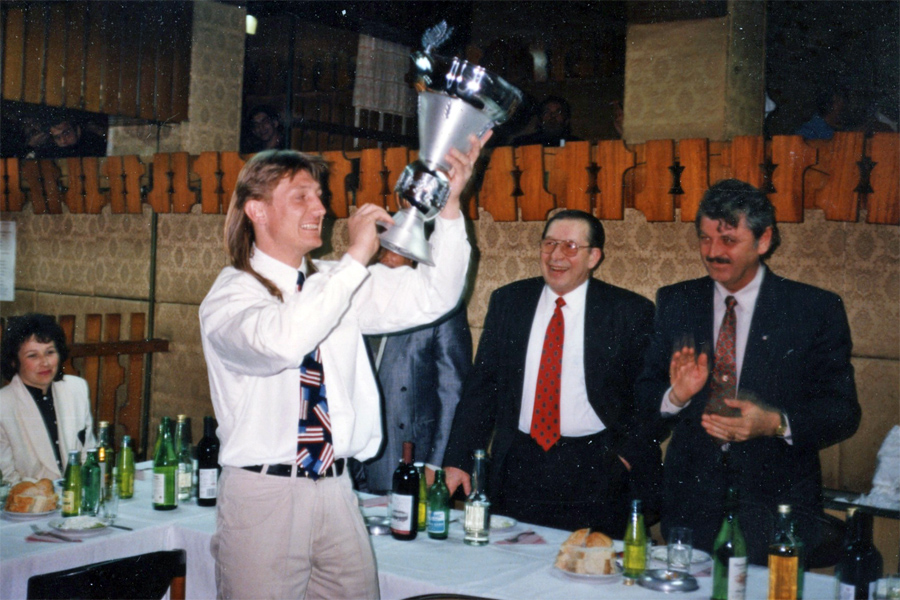 At banquet, Bill Russell hoists our trophy
At banquet, Bill Russell hoists our trophy
Sofia Sevens: what does
the future hold?
I reckon that this is one of those tournaments whose
future can go either way: just pulling off the tournament was a
great feat, but the absence of so many invited teams is a worry.
Hopefully the participants will go back with words of praise for
the tournament and word of mouth will increase the number of teams
that take part. Folks, you don't know what you're missing!.
March may not be the ideal time (we sure wouldn't have liked
playing the games in the snow), but I don't know enough about the
Eastern European rugby calendar to know if they have a better one.
Certainly, the establishment of a successful sevens tournament can
only help rugby in Bulgaria and all of Eastern Europe. I
would recommend this tournament to those who enjoy combining
sevens with unique experiences. If you're interested in
participating, contact me via Rugby and I'll put you in touch with
Nikolai.


